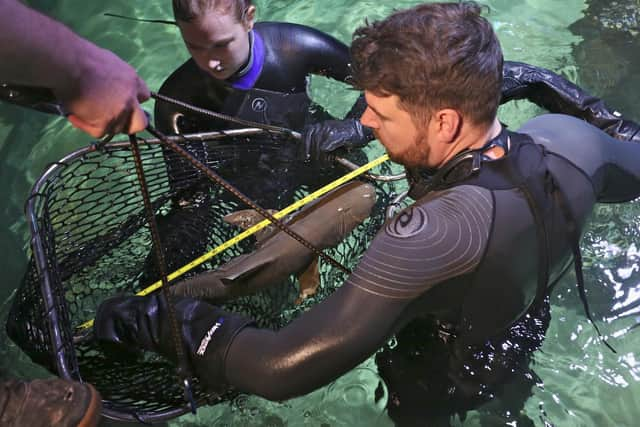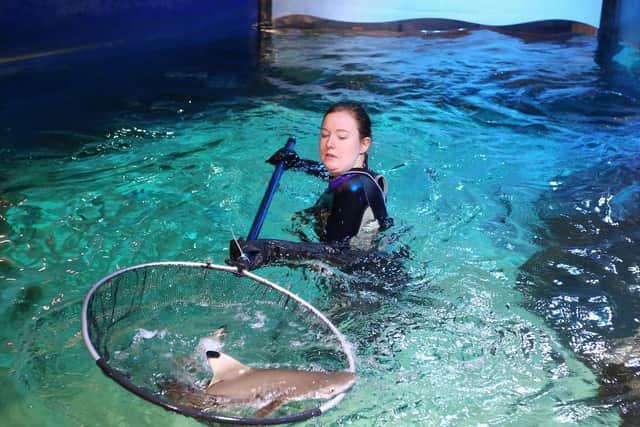Meet Blackpool's record breaking baby shark twins
and live on Freeview channel 276
Experts have spent the past 12 months closely supervising the progress of the blacktip reef pups at Sea Life, in Blackpool.
Some nights aquarists have been required to sleep over at the aquarium to monitor the pair as the survival rate of baby sharks in the wild is less than one in 10
Advertisement
Hide AdAdvertisement
Hide AdIn the open sea most shark pups die shortly after birth, facing threats from larger predators including other sharks and even their own mother, as they have to be completely independent, hunting and feeding themselves, right from birth.


Named Koda and Cleo, they now measure almost twice as big as when they were born with male pup Koda now 75cm long, while female pup Cleo is fractionally bigger at 76cm. Their weight has almost doubled, increasing to 6.5kgs for Koda and 5.6kgs for Cleo.
Monitoring the pups’ growth involves a highly-skilled operation to carefully catch each shark pup in a giant net and then weigh and measure them. The twins are fed twice a day and their favourite food is fresh mackerel.
The sharks were delivered in a special birthing area, screened off from other creatures, in an operation which took five years of planning. Aquarists supervised both births before immediately removing the pups for their safety to a special quarantine tank.
Advertisement
Hide AdAdvertisement
Hide AdThis had followed meticulous planning over the previous 12 months to try to identify when female sharks were pregnant and at what stage. A detailed plan was developed for every stage of the pregnancy, birth and nursery stage, including diet and welfare.


A special area was created within the main shark display, where the female could be looked after, when curator Scott Blacker and his team believed the expectant shark was in the later stages of pregnancy.
Aquarists monitored the small pups round the clock for the first few days, hand-feeding pieces of fresh salmon to them, to encourage them to start feeding. It marked a big breakthrough as the important first litter to have been born in the UK.
Aquarium curator Scott Blacker said: “To have both pups healthy and continuing to grow well after their crucial first year is a huge result for all of the aquarists and wider team here.
Advertisement
Hide AdAdvertisement
Hide Ad“I’d like to thank them all for their commitment and hard work. Long nights and careful monitoring have been required to provide the best possible care for the twins. We’re delighted to have reach this milestone.”
Matthew Titherington, general manager at Sea Life Blackpool, said: “This is an important moment. Baby sharks really struggle to survive in the wild, compounding already falling numbers due to shark fishing.
“I’m incredibly proud of the team and their achievement in successfully rearing the first shark pup twins to their first birthday. They are both in great health, excellent condition and continue to grow well.
“These were the first shark pup twins born in the UK. We are dedicated to providing the best possible care for the many species we house here, but more than that want to do everything we can to support populations of these vulnerable species.
Advertisement
Hide AdAdvertisement
Hide Ad“Our shark pup twins provide a valuable boost to research surrounding this species, as well as strengthening breeding programmes across Europe, helping to safeguard shark populations.”
The International Union for Conservation of Nature has officially listed blacktip reef sharks as near threatened.
They typically can be found in Indian and Pacific Oceans and significant declines in some parts of the world have been seen in recent years, primarily caused by overfishing and plastic pollution.
Their low reproductive rate means shark populations can struggle to recover from depleted numbers.
Sea Life visitors can now see the shark pups swimming together in the special shark nursery area.
Comment Guidelines
National World encourages reader discussion on our stories. User feedback, insights and back-and-forth exchanges add a rich layer of context to reporting. Please review our Community Guidelines before commenting.